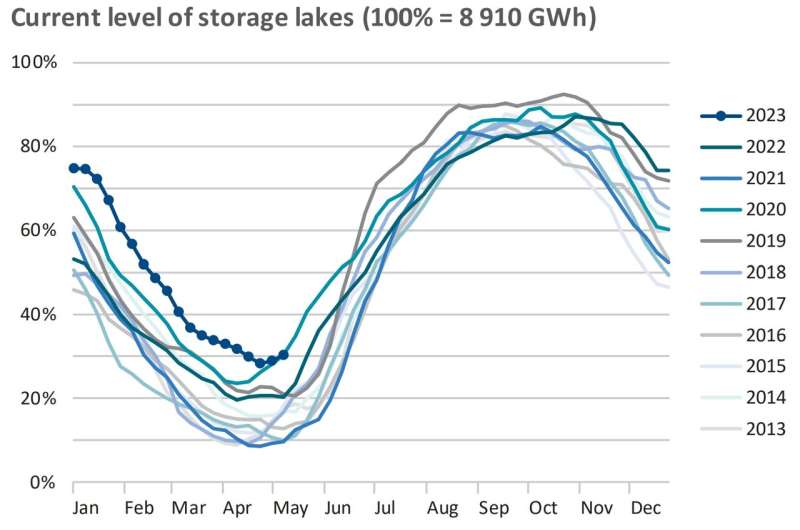This article has been reviewed according to Science X's editorial process and policies. Editors have highlighted the following attributes while ensuring the content's credibility:
fact-checked
trusted source
proofread
Energy security in a climate-neutral Switzerland is possible, say experts

As with many other countries throughout the world, Switzerland has set itself the target of net zero greenhouse gas emissions by 2050 at the latest. Recent developments such as the Russian war of aggression in Ukraine and the resulting energy crisis in Europe have aroused concerns about energy security, particularly in the winter months, among the Swiss population and raised questions about the climate and energy policy direction of the federal government.
It was in this context that researchers from ETH Zurich's Energy Science Center (ESC) took a detailed look at the question of whether and under what conditions Switzerland could achieve its target of net zero emissions by 2050 and ensure continuous security of energy supply. The researchers have now published their findings in a white paper: "Energy security in a net zero emissions future for Switzerland."
"Our qualitative analysis shows that the complete decarbonization of Switzerland's energy system is compatible with a high degree of energy security under certain conditions," says Gaby Hug, ETH professor in electrical energy systems. "The challenges are big, but not insuperable." Hug is the Chair of the Energy Science Center's Managing Board and a member of the Expert Group Security of Supply, which was convened last year and which is responsible for this new white paper.
Net zero scenarios demonstrate feasibility
An energy supply system is generally regarded as secure when sufficient energy is available without disruption and at affordable prices. To determine the state of energy supply security for Switzerland, the expert group drew on research conducted by ETH Zurich and the ETH Domain. Its analysis was based on several independent energy system models from the ETH Domain, from which it derived four energy scenarios to investigate a possible net zero future. These scenarios differ in their underlying assumptions about whether electricity trading with neighboring countries will be restricted, and whether offsetting of residual CO2 emissions abroad is possible.
Simulations of all four scenarios show that while electrification of the transport and heating sectors would reduce overall energy demand, annual demand for electricity specifically would increase from 60 terawatt hours (TWh) to at least 80 to 100 TWh. In each scenario, growing electricity demand can be met primarily by domestic renewable energy sources and trading of renewable electricity.
"If electrification and the expansion of renewables take place at the same time, consumption and generation will increase in harmony and rapid decarbonization will be possible," says the energy systems expert. For long-distance transport and aviation, which is much more difficult to electrify, (imported) bio and synthetic fuels could meet demand. "Every scenario confirms both the technical feasibility and affordability of a secure energy supply with net zero emissions by 2050," says Hug.
Electricity trading boosts energy security
According to the expert group, the key prerequisites are the long-term efficient integration of Switzerland into the European electricity market and the rapid expansion of electricity production from various renewable sources, both domestic and international.
Christian Schaffner, Executive Director of the ESC, explains: "The more renewable electricity we produce, the lower our dependence on imports of fossil fuels. This also reduces the risk of interruptions to supply from monopolistic supply sources, such as we have seen with natural gas from Russia." A diversified and decentralized renewable electricity infrastructure is also considered less susceptible to damage and would increase energy security, as long as efficient energy trading is guaranteed.
"That's why Switzerland needs efficient access to the European electricity market in which it can balance out the numerous, fluctuating renewable energy sources by time and region," says Schaffner, who is coordinating the work of the expert group in partnership with Kirsten Oswald.
Expansion of winter electricity production
Even with substantial growth in domestic production, Switzerland will have to continue to import electricity in winter and export it in summer. Energy security could thus be enhanced by expanding winter-productive sources, such as wind, alpine photovoltaics and seasonal heat storage.
The white paper also cited nuclear energy as an option. As long as the existing nuclear power plants are in operation, they can support the phase-out of fossil energy sources. However, given the current lack of political framework conditions and the hard to calculate construction costs and timelines, new reactors are unlikely to be built before 2050.
Benefits beyond the energy system
Finally, the ESC experts pointed out that although a fossil-free energy system certainly comes with costs, the status quo is hardly cost free. Regardless of what the energy system of the future looks like, the coming decades will require massive investments in energy assets. Along with increased energy security, a fossil-free energy system offers numerous other benefits.
If Switzerland manages to reduce greenhouse gas and pollutant emissions and prevent further climate change, in concert with other countries, it will gain improved quality of air, water and soil, and preserve the basis of life for humans and all living creatures. "These aspects are not easily translated into monetary value, but they are without a doubt of utmost value," says Schaffner.
This white paper is the second analysis by the Expert Group Security of Supply, joining the policy brief "Steps to Fossil-Fuel Independence for Switzerland," which it issued in summer 2022.
More information: Report: ethz.ch/content/dam/ethz/speci … _Energy_Security.pdf


















